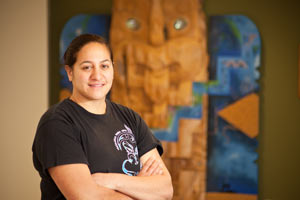 Thursday 28 April 2016 3:44pm
Thursday 28 April 2016 3:44pm Courtney Sullivan
Courtney Sullivan
Masters student
Anatomy and Māori Studies/Te Tumu
Seeing things from a slightly different perspective has led Masters student Courtney Sullivan down a seldom-trodden path researching Māori attitudes to the body after death, and she believes she couldn't have done it anywhere else but Otago.
Courtney has undergraduate degrees from both Anatomy and Māori Studies/Te Tumu, a duality that inspired her choice of topic.
“While working in Anatomy labs with cadavers I felt that, as a Māori student, my experience was different to other cultures. I wanted to see whether or not others felt the same.”
Guided by supervisor Associate Professor Poia Rewi (Māori Studies), Courtney's research explored people's attitudes on an issue that has very little written about it in general and, more importantly from her perspective, far less in relation to Māori.
“I was able to examine the experiences of Anatomy students dealing with cadavers in laboratories. I delved into the world of undertakers to see what their attitudes were to the body and whether or not this differed from the everyday person.
“I was able to investigate the experiences of widows and see how their perceptions to bodies may change with the loss of their husbands, and I was also able to look at the views of regular tangihanga attendees and tell their story of what they see on a marae in relation to bodies. All these experiences were viewed through a Māori lens with full consideration of important Māori concepts, such as tapu and noa.”
Courtney found that Māori have more invested in their cultural practices to do with death and this is used to help maintain cultural practices. She also concluded that, seemingly, Māori are more comfortable with the body and death itself, while using their knowledge of karakia and ritual to protect themselves from possible harm.
Courtney says she has been motivated in part by a wish to give something back to the Anatomy Department to help it be mindful of Māori culture.
She acknowledges the University's great resources, which helped provide her with knowledge she doesn't believe is obtainable elsewhere. “The library, lecturers, computing facilities and people that know what you want to know when you want to know it, all in an environment that is for students.”
It hasn't all been work for her. Otago has also offered competitive rugby and social netball, badminton and touch. She is involved with University Kapa haka and is passionate about meeting new people. Courtney's urge to give back to the university crops up again in tutoring Māori papers.
Courtney has known she wanted to come to Otago since she was a 14-year-old student at Whakatāne High School; she foresaw a “new place far away from home where, to my knowledge, I knew no one. A place to be independent and free.”
Still, she counts her family as a motivating force and homing beacon.
“My family make me proud of my achievements and make me want to achieve more. I want to get these qualifications so I can take them back to help my family and my people and show them that anything is possible.”
Find out more about Te Tumu at www.otago.ac.nz/tetumu/
